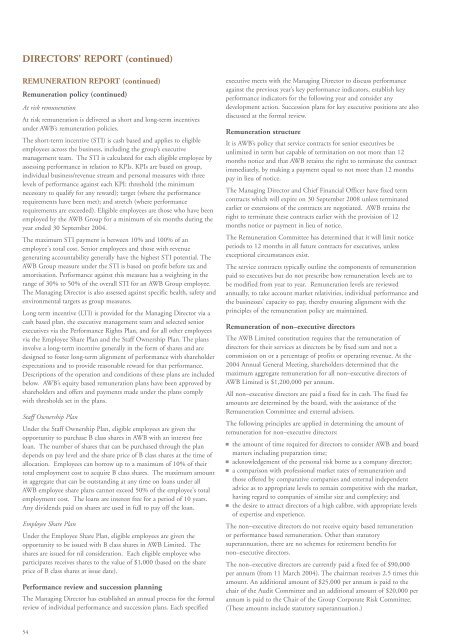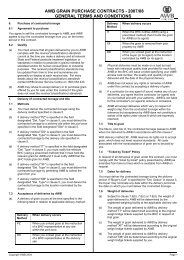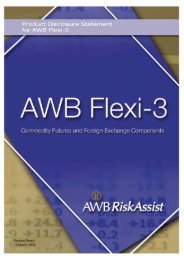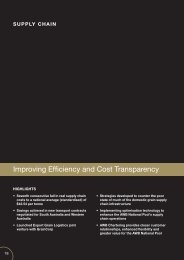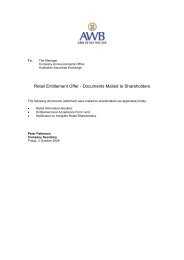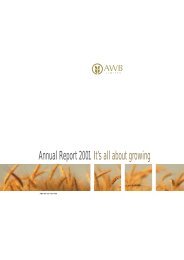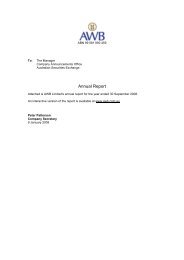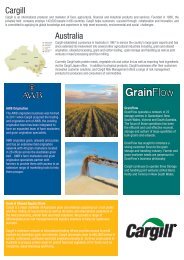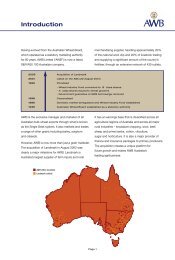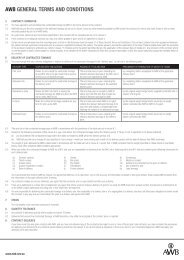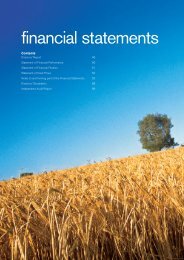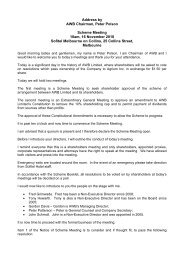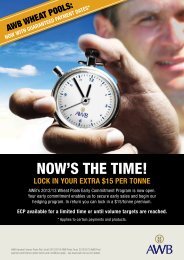AWB Limited - 2004 Annual Report
AWB Limited - 2004 Annual Report
AWB Limited - 2004 Annual Report
You also want an ePaper? Increase the reach of your titles
YUMPU automatically turns print PDFs into web optimized ePapers that Google loves.
DIRECTORS' REPORT (continued)<br />
REMUNERATION REPORT (continued)<br />
Remuneration policy (continued)<br />
At risk remuneration<br />
At risk remuneration is delivered as short and long-term incentives<br />
under <strong>AWB</strong>’s remuneration policies.<br />
The short-term incentive (STI) is cash based and applies to eligible<br />
employees across the business, including the group’s executive<br />
management team. The STI is calculated for each eligible employee by<br />
assessing performance in relation to KPIs. KPIs are based on group,<br />
individual business/revenue stream and personal measures with three<br />
levels of performance against each KPI: threshold (the minimum<br />
necessary to qualify for any reward); target (where the performance<br />
requirements have been met); and stretch (where performance<br />
requirements are exceeded). Eligible employees are those who have been<br />
employed by the <strong>AWB</strong> Group for a minimum of six months during the<br />
year ended 30 September <strong>2004</strong>.<br />
The maximum STI payment is between 10% and 100% of an<br />
employee's total cost. Senior employees and those with revenue<br />
generating accountability generally have the highest STI potential. The<br />
<strong>AWB</strong> Group measure under the STI is based on profit before tax and<br />
amortisation. Performance against this measure has a weighting in the<br />
range of 30% to 50% of the overall STI for an <strong>AWB</strong> Group employee.<br />
The Managing Director is also assessed against specific health, safety and<br />
environmental targets as group measures.<br />
Long term incentive (LTI) is provided for the Managing Director via a<br />
cash based plan, the executive management team and selected senior<br />
executives via the Performance Rights Plan, and for all other employees<br />
via the Employee Share Plan and the Staff Ownership Plan. The plans<br />
involve a long-term incentive generally in the form of shares and are<br />
designed to foster long-term alignment of performance with shareholder<br />
expectations and to provide reasonable reward for that performance.<br />
Descriptions of the operation and conditions of these plans are included<br />
below. <strong>AWB</strong>’s equity based remuneration plans have been approved by<br />
shareholders and offers and payments made under the plans comply<br />
with thresholds set in the plans.<br />
Staff Ownership Plan<br />
Under the Staff Ownership Plan, eligible employees are given the<br />
opportunity to purchase B class shares in <strong>AWB</strong> with an interest free<br />
loan. The number of shares that can be purchased through the plan<br />
depends on pay level and the share price of B class shares at the time of<br />
allocation. Employees can borrow up to a maximum of 10% of their<br />
total employment cost to acquire B class shares. The maximum amount<br />
in aggregate that can be outstanding at any time on loans under all<br />
<strong>AWB</strong> employee share plans cannot exceed 50% of the employee's total<br />
employment cost. The loans are interest free for a period of 10 years.<br />
Any dividends paid on shares are used in full to pay off the loan.<br />
Employee Share Plan<br />
Under the Employee Share Plan, eligible employees are given the<br />
opportunity to be issued with B class shares in <strong>AWB</strong> <strong>Limited</strong>. The<br />
shares are issued for nil consideration. Each eligible employee who<br />
participates receives shares to the value of $1,000 (based on the share<br />
price of B class shares at issue date).<br />
Performance review and succession planning<br />
The Managing Director has established an annual process for the formal<br />
review of individual performance and succession plans. Each specified<br />
executive meets with the Managing Director to discuss performance<br />
against the previous year’s key performance indicators, establish key<br />
performance indicators for the following year and consider any<br />
development action. Succession plans for key executive positions are also<br />
discussed at the formal review.<br />
Remuneration structure<br />
It is <strong>AWB</strong>’s policy that service contracts for senior executives be<br />
unlimited in term but capable of termination on not more than 12<br />
months notice and that <strong>AWB</strong> retains the right to terminate the contract<br />
immediately, by making a payment equal to not more than 12 months<br />
pay in lieu of notice.<br />
The Managing Director and Chief Financial Officer have fixed term<br />
contracts which will expire on 30 September 2008 unless terminated<br />
earlier or extensions of the contracts are negotiated. <strong>AWB</strong> retains the<br />
right to terminate these contracts earlier with the provision of 12<br />
months notice or payment in lieu of notice.<br />
The Remuneration Committee has determined that it will limit notice<br />
periods to 12 months in all future contracts for executives, unless<br />
exceptional circumstances exist.<br />
The service contracts typically outline the components of remuneration<br />
paid to executives but do not prescribe how remuneration levels are to<br />
be modified from year to year. Remuneration levels are reviewed<br />
annually, to take account market relativities, individual performance and<br />
the businesses’ capacity to pay, thereby ensuring alignment with the<br />
principles of the remuneration policy are maintained.<br />
Remuneration of non–executive directors<br />
The <strong>AWB</strong> <strong>Limited</strong> constitution requires that the remuneration of<br />
directors for their services as directors be by fixed sum and not a<br />
commission on or a percentage of profits or operating revenue. At the<br />
<strong>2004</strong> <strong>Annual</strong> General Meeting, shareholders determined that the<br />
maximum aggregate remuneration for all non–executive directors of<br />
<strong>AWB</strong> <strong>Limited</strong> is $1,200,000 per annum.<br />
All non–executive directors are paid a fixed fee in cash. The fixed fee<br />
amounts are determined by the board, with the assistance of the<br />
Remuneration Committee and external advisers.<br />
The following principles are applied in determining the amount of<br />
remuneration for non–executive directors:<br />
the amount of time required for directors to consider <strong>AWB</strong> and board<br />
matters including preparation time;<br />
acknowledgement of the personal risk borne as a company director;<br />
a comparison with professional market rates of remuneration and<br />
those offered by comparative companies and external independent<br />
advice as to appropriate levels to remain competitive with the market,<br />
having regard to companies of similar size and complexity; and<br />
the desire to attract directors of a high calibre, with appropriate levels<br />
of expertise and experience.<br />
The non–executive directors do not receive equity based remuneration<br />
or performance based remuneration. Other than statutory<br />
superannuation, there are no schemes for retirement benefits for<br />
non–executive directors.<br />
The non–executive directors are currently paid a fixed fee of $90,000<br />
per annum (from 11 March <strong>2004</strong>). The chairman receives 2.5 times this<br />
amount. An additional amount of $25,000 per annum is paid to the<br />
chair of the Audit Committee and an additional amount of $20,000 per<br />
annum is paid to the Chair of the Group Corporate Risk Committee.<br />
(These amounts include statutory superannuation.)<br />
54


